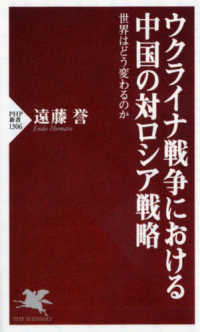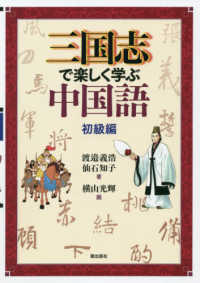- ホーム
- > 洋書
- > 英文書
- > History / World
Full Description
Offers a transformative reading of the Marxist tradition by uncovering its connections to the institutions and practices of worker education.
For the past hundred years, "vulgar Marxism" has been the go-to insult among socialist and communist intellectuals, a shorthand for the ways Marxist theory could go wrong. But why would thinkers advocating for working-class emancipation use "vulgarity" as an epithet?
In Vulgar Marxism, Edward Baring seeks an answer by delving into debates over Marxism in the first decades of the twentieth century. He shows that this common phrase wasn't aimed primarily at popular understandings of Marx. Rather, it was used to attack intellectuals for failing to teach Marx's theory to the working masses correctly. His history of "vulgar Marxism" homes in on the project of mass worker education at a time when the project was both widely pursued and fiercely contested.
Worker education offered a mechanism through which Marxist theory was meant to promote large-scale social and political change, and it drew on a massive infrastructure of schools, publishing houses, and educational bureaus that stretched across Europe and reached millions. By centering this project, Baring radically recasts the history of Marxism from the Second International to World War II. He challenges classic oppositions between "economistic" and "cultural" versions of Marxism; rereads many of the most significant Marxist theorists of the time, including Karl Kautsky, Rosa Luxemburg, Georg Lukács, and Antonio Gramsci; and offers new resources for understanding how Marxist ideas transformed as they traveled around Europe and then spread throughout the world.
Contents
Introduction
Part I: The Infrastructure of Class Consciousness, 1891-1917
Chapter 1: Marxist Theory for a Mass Party
Chapter 2: Pedagogical Debates in German Social Democracy
Interlude: Lenin's Revolutionary Lesson
Part II: Worker Education in Crisis, 1917-1931
Chapter 3: Georg Lukács and the Dilemmas of Vulgarity
Chapter 4: Marxism of, by, and for the People: Karl Korsch and the Problem of Worker Education
Chapter 5: Beyond Marxism? Hendrik de Man and the Psychology of Worker Education
Chapter 6: Antonio Gramsci and the Education of an Organic Intellectual
Chapter 7: José Carlos Mariátegui and the Limits of Vulgar Marxism
Epilogue
Acknowledgments
Notes
Bibliography
Index








